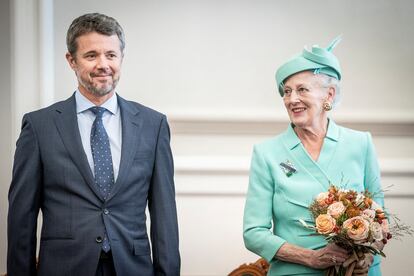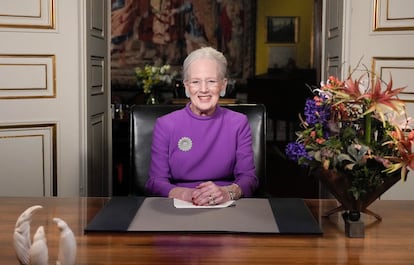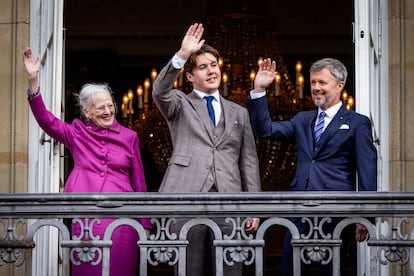Crown Prince Frederick of Denmark, the informal prince who promises to maintain the traditions of the monarchy
The popular son of Queen Margrethe II will ascend to the throne of one of the world’s oldest monarchies on January 14


At 55 years of age, Crown Prince Frederik will become king of Denmark on January 14. From that day on, he will be called Frederik X and his title will recall Denmark’s long history of monarchy, dating back to the legendary Viking kings. They were the undisputed leaders in the lands that ultimately formed the Kingdom of Denmark, which today also includes Greenland and the Faroe Islands, in the Atlantic.
The abdication of his mother, Queen Margrethe II, at the age of 83 was announced this Sunday. After half a century on the throne, the monarch has decided it is time for the heir to take the reins. Assuming the crown and its symbolic function and representation of the country will involve some readjustments to the relaxed lifestyle that Frederik has enjoyed until now — including a recent getaway to Madrid, where he met Genoveva Casanova, the ex-daughter-in-law of the late Duchess of Alba. The future king, who, like his mother, is very popular among the Danes, will become the head of state and head of the Evangelical Lutheran Church of Denmark.
January 14 marks the 52nd anniversary of Queen Margrethe II’s accession to the throne. In 2022, during the 50th anniversary of her reign, Crown Prince Frederik said in a speech that, when the time came, he would be ready. “I will guide the ship and succeed you as you did your father [King Frederik IX],” were his words.

The promise of continuity and respect for the institution he is about to represent takes place in a country where republicanism is nominal. “Only 15% of the population is republican and this is because the Danes have linked their identity as a small country to the presence of an ancient and respected monarchy,” says Sebastian Olden-Jorgensen from the University of Copenhagen, a historian and expert on the Royal House. In a telephone conversation, he adds that the monarchy “is immensely popular” and the queen’s abdication is not an attempt to resolve tensions or contain scandals within the royal family. “I think it is a logical reaction to her health failing. Maybe she could keep up appearances for a while, but she has seen her own fragility. Although the abdication is a novelty in Denmark, there are very few people who believe that the queen is obliged to continue.”
According to Olden-Jorgensen, the current success is due to the fact that there has been a “line of competent male kings, and then Queen Margrethe, who have lived up to their role and carefully adapted the monarchy over time.” He compares the institution to a family business that has accumulated its fortune — understood here as reputation and goodwill — over the years. “Maintaining it depends on the members of the dynasty and, here, the Danish royal family has known how to behave. Ultimately, everything depends on personality and that is like a lottery. Just like in anyone’s life.” What do you think, then, of the presence of the future Danish king in Spain and with a woman who is not his wife, Princess Mary? “It seems that the Danes have been entertained by this story [revealed by the magazine Lecturas] but they do not consider it serious. It was stupid of them and if it was just one time, people will forgive and forget.”
The fact that the prince spent the night at Genoveva Casanova’s house and waited alone in the street for a car to pick him up seems to him “part of his informal style, and he will have to be more prudent and dignified as king.” “A large part of the prince’s success among his compatriots is his non-rigid behavior and he will have to mature in this area,” he says. At the same time, Olden-Jorgensen recalls that Princess Mary can act as a counterweight “because she brings dignity. She is well respected and is moving the monarchy towards causes such as the defense of the LGBTQ+ community and climate conservation.” Her husband, meanwhile, “seems more interested in sports and music.” The couple met in 2000, at the Olympic Games in Sydney, Australia, her native country, and married in Copenhagen in 2004. They have four children who now form the first line of succession: Christian (18 years old), Isabella (16) and the twins Vincent and Josephine (12 years old). The eldest is already popular among the Danes.

Frederik André Henrik Christian, Crown Prince of Denmark, and Count of Monpezat through the paternal line, was born on May 26, 1968. He is the son of Queen Margrethe II and her husband, Prince Henri, of French origin, and he has a younger brother, Prince Joachim. He studied in Denmark and in France. He has a master’s degree in Political Science from the Danish University of Aarhus, and he also attended classes at the University of Harvard for a year. As with other European ruling houses, he has been trained in the military academies of the land, air, and sea forces. According to the Royal Family’s website, he is a commander of the navy and a colonel in the other two services, and is still active in the field of defense. In addition to Danish, he speaks English, French, and German, and to his inclination for the environment he adds a passion for sport. The Royal Race, in which he participates, brings together nearly 80,000 ordinary citizens every year and is one of the largest events of its kind on a national scale.
The positive relationship he maintains with his mother today contrasts with the discomfort shown during his youth with the media focus on him as future king. At that time, he also regretted the supposed distance of his parents, who were more focused on their royal duties than on their two children. It is a criticism similar to that King Charles III of the United Kingdom directed to his late parents, Queen Elizabeth II and Prince Philip, the Duke of Edinburgh. Over time, the Danish and British heirs have softened their reproaches, especially because the concerns of their private lives have also generated tensions within their homes.
“Mother and son are very close. Yes, there has been a crisis between the queen and her second son, Joachim, over the withdrawal of the royal titles from his children,” admits Olden-Jorgensen. It was a step in line with the adjustment made by other European royal houses regarding the number of their serving members and recipients of public funds. “In the case of Denmark, it was not done elegantly and this caused pain to the son and grandchildren. It was handled poorly and tactlessly.” From now on, Nicolás, Félix, Henrik, and Athena — children of Prince Joachim; the two eldest, from his first marriage — will be able to freely decide their future without their actions having repercussions on the monarchy. What will happen to Joachim? “He lives in the United States [along with his wife, Princess Marie, and their two youngest children] and I think he will stay abroad. Somehow, he has not been able to find his place in Denmark, although being second in a Royal House is never easy,” the expert suggests.
Sign up for our weekly newsletter to get more English-language news coverage from EL PAÍS USA Edition
Tu suscripción se está usando en otro dispositivo
¿Quieres añadir otro usuario a tu suscripción?
Si continúas leyendo en este dispositivo, no se podrá leer en el otro.
FlechaTu suscripción se está usando en otro dispositivo y solo puedes acceder a EL PAÍS desde un dispositivo a la vez.
Si quieres compartir tu cuenta, cambia tu suscripción a la modalidad Premium, así podrás añadir otro usuario. Cada uno accederá con su propia cuenta de email, lo que os permitirá personalizar vuestra experiencia en EL PAÍS.
¿Tienes una suscripción de empresa? Accede aquí para contratar más cuentas.
En el caso de no saber quién está usando tu cuenta, te recomendamos cambiar tu contraseña aquí.
Si decides continuar compartiendo tu cuenta, este mensaje se mostrará en tu dispositivo y en el de la otra persona que está usando tu cuenta de forma indefinida, afectando a tu experiencia de lectura. Puedes consultar aquí los términos y condiciones de la suscripción digital.








































